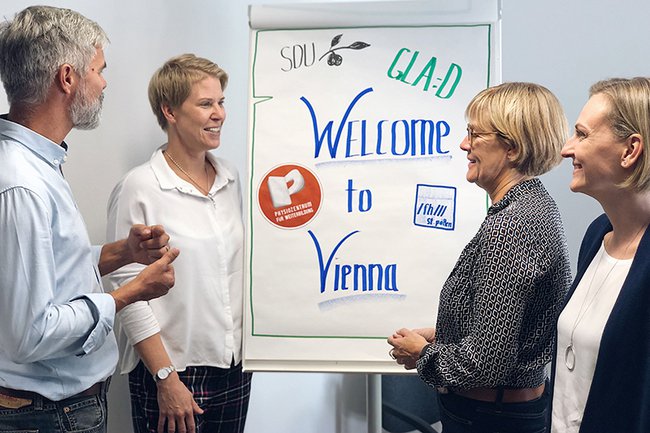New Ways of Treating Osteoarthritis
New Further Education Course for Physiotherapists Offers Patients a Better Life with Osteoarthritis

The Physio Centre for Further Education and the St. Pölten UAS are bringing an international, renowned treatment programme for patients with knee and and hip osteoarthritis to Austria. The concept, which is originally from Denmark, is called “GLA:D® – Good Life with osteoArthritis in Denmark“. After completing the course, the physiotherapists receive the GLA:D® certificate and may treat patients according to these new regulations and thus offer their patients a better life with osteoarthritis.
Unique Programme Now Also in Austria
GLA:D® was introduced in Denmark in 2013 with the aim of implementing into practice international best practice guidelines. Within 6 years, around 38,000 patients with knee or hip arthrosis completed the programme. By now, the programme has been expanded to four more countries.
In autumn, the further education programme for physiotherapists starts at the Physio Centre for Further Education in Austria. The St. Pölten UAS is a partner of the programme and is responsible for the scientific analysis of the data that are collected from patients and physiotherapists within the framework of the programme and entered into the system for quality control reasons. This scientific analysis and the resulting findings provide an enormous potential for clinical follow-up projects and also intensify the existing, well-established connection between research and teaching at the St. Pölten UAS.
At present, the first physiotherapists in Austria are trained by their Danish colleagues – due to the coronavirus, in the form of online courses. They will be awarded the GLA:D® certificate and will also be given the authorisation to offer courses independently. From September onwards, these courses will be offered at the Physio Centre for Further Education in Vienna and Innsbruck.
Less Pain through Better Treatment
After completing the GLA:D® programme, patients should experience less pain and be able to “manage“ their knee and hip problems independently. “After 12 months, long-term results from Denmark have confirmed the programme’s success. Pain, ambulatory ability and life quality have considerably improved in patients and remain better in the long term”, says Martin Metz, Executive Director at the Physio Centre for Further Education. Some impacts of the programme: pain reduction, improved life quality, less need for painkillers and reduced numbers of patients taking sick leave.
The GLA:D® programme offers a unified medical examination and a standardised, evidence-based and tried-and-tested consultation, instruction and exercise programme that provides the options needed by the patients to control and intensify their personal programme. The programme is continuously evaluated. To ensure the programme’s quality control, all patients‘ data are anonymously analysed. The data analysis is carried out by the Institute of Health Sciences at the St. Pölten UAS. The final results are forwarded to the central research project at the University of Southern Denmark. In Denmark, the data are entered into a general patient registry. In this way, a worldwide dataset is created over time, which may be used by all cooperation partners from all countries for their research.
“The analysis enables the certified physiotherapists to control and improve the quality of their programme. Furthermore, the data form the basis for necessary reports on the success of the further education courses and treatments“, explains Barbara Wondrasch, lecturer at the St. Pölten UAS’ Department of Health.